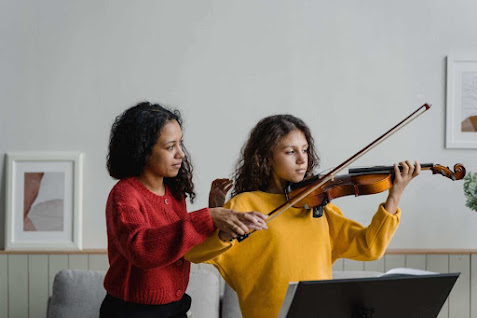Mastering the Melody: A Complete Guide to Violin Lessons
Introduction:
The haunting strains of a violin have captivated audiences for centuries, making it one of the most enchanting and expressive musical instruments. Learning to play the violin is a journey that requires dedication, patience, and the guidance of a skilled instructor. In this blog, we will explore the world of violin lessons, from the basics of choosing the right instrument to the advanced techniques that will elevate your playing to new heights.
Choosing the Right Violin:
The first step on your violin journey is selecting the right instrument. Whether you are a beginner or an experienced player, finding a violin that suits your needs is crucial. Consider factors such as size, budget, and quality. Beginners should start with a student-grade violin and upgrade as their skills progress. Seek advice from a knowledgeable instructor or a reputable music store to ensure you make an informed decision.
Finding the Right Instructor:
Having a skilled and supportive instructor is invaluable when learning the violin. Look for a teacher with experience in classical or contemporary violin, depending on your musical interests. A good instructor will not only teach you proper technique but also inspire and motivate you to reach your full potential. Consider taking trial lessons with different instructors to find someone whose teaching style resonates with you.
Setting Realistic Goals:
Learning the violin is a gradual process, and setting realistic goals is essential for sustained progress. Break down your musical journey into short-term and long-term objectives. Whether it's mastering a specific piece, improving bowing technique, or enhancing intonation, setting achievable goals will keep you motivated and focused.
Building a Strong Foundation:
Before diving into complex pieces, it's crucial to build a strong foundation of basic skills. Proper posture, bowing technique, and hand positioning are fundamental aspects that contribute to your overall playing ability. Paying attention to these foundational elements from the start will prevent bad habits and set the stage for advanced techniques.
Understanding Music Theory:
A solid understanding of music theory is essential for any aspiring violinist. Learning to read sheet music, understand key signatures, and grasp musical notation will enhance your ability to interpret and play pieces accurately. Dedicate time to studying music theory alongside your practical lessons to develop a well-rounded musical education.
Practicing with Purpose:
Consistent and purposeful practice is the key to mastering the violin. Develop a practice routine that includes warm-up exercises, technical drills, and repertoire practice. Aim for quality over quantity, focusing on refining specific aspects of your playing rather than mindlessly repeating passages. Regular, focused practice sessions will yield significant improvement over time.
Exploring Different Styles:
The violin is a versatile instrument that can be found in various musical genres, from classical to folk, jazz to contemporary. While it's essential to build a strong foundation in classical technique, exploring different styles will broaden your musical horizons and make learning the violin an enriching experience. Experiment with different genres to discover the unique characteristics of each and find what resonates with you.
Mastering Bowing Techniques:
The bow is the violinist's primary tool for creating a beautiful sound. Mastering bowing techniques is crucial for achieving a rich and expressive tone. Techniques such as legato, staccato, spiccato, and sautillé require precision and control. Regularly practicing these techniques under the guidance of your instructor will elevate your playing and add nuance to your musical expression.
Overcoming Challenges:
Learning the violin comes with its fair share of challenges. From mastering difficult passages to overcoming performance anxiety, it's essential to approach challenges with a positive mindset. Break down challenging sections into smaller, more manageable parts, and practice them slowly and deliberately. Embrace the process of learning and consider challenges as chances for personal growth.
The Importance of Ear Training:
Developing a keen ear is a crucial aspect of becoming a proficient violinist. Ear training enhances your ability to play in tune, improvise, and interpret music with greater accuracy. Incorporate ear training exercises into your practice routine, such as playing scales and intervals by ear, and transcribing simple melodies. Over time, your ear will become more attuned to the nuances of pitch and intonation.
Participating in Ensemble and Solo Performances:
Playing in ensembles or performing solo pieces is an integral part of a violinist's development. Joining a chamber group, or orchestra, or collaborating with other musicians provides valuable experience in ensemble playing and fosters a sense of musical community. Solo performances, whether in recitals or competitions, challenge you to apply your skills under pressure and showcase your musicality.
Utilizing Technology and Resources:
Take advantage of technology and online resources to supplement your violin lessons. Numerous apps, websites, and instructional videos can help reinforce your learning. Tuner apps, metronomes, and virtual sheet music libraries are just a few examples of tools that can enhance your practice sessions. Additionally, online forums and communities allow you to connect with other violinists, exchange tips, and seek advice.
Conclusion:
Embarking on the journey of learning the violin can be a very rewarding and fulfilling experience. To make the most out of this experience, you should ensure that you have the right instrument, find a qualified instructor, and commit to consistent practice. By doing so, you can unlock the full expressive potential of this beautiful instrument. Remember to set realistic goals, focus on building a strong foundation, and embrace the challenges that come with mastering the violin. Whether you aspire to play classical masterpieces or explore contemporary genres, the violin offers a rich and diverse musical landscape waiting to be explored.


Great post Volo, keep them coming!
ReplyDelete---------
Make your music easily discoverable. Create your artist profile on CKORD today!